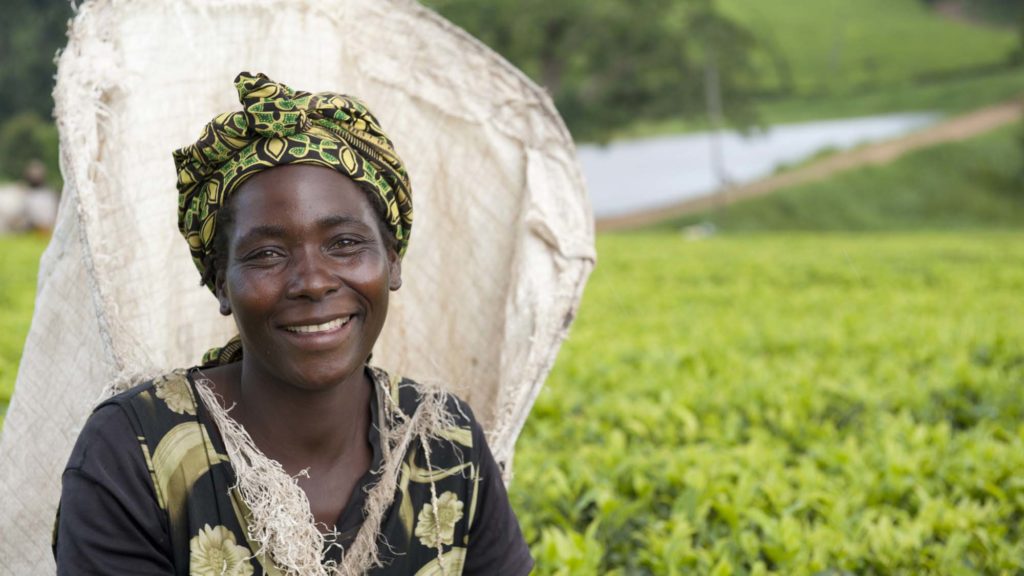Satemwa Tea Estate is located in the Shire Highlands of southern Malawi. Tea is a major employer and earner of foreign exchange for the Malawian economy.
Background
One of the oldest tea estates in Malawi, it was founded in 1923 by Maclean Kay, a Scottish emigrant and former rubber planter in Malaya, and has been handed down from generation to generation of the Cathcart-Kay family.
Half of the estate workers live on the estate, the others in nearby villages. Off-estate, only 40% of workers’ houses have iron sheet roofing rather than thatched roofs and only 20% have access to safe drinking water. Almost half of workers’ children drop out of primary school and only 30% continue to secondary education. Workers traditionally struggle to buy enough food during the dry, off-peak season when little tea is harvested and sold. With 99% of production destined for export markets, tea is the second largest export after tobacco and accounts for 8% of the country’s total export earnings. More than 93% of tea is produced by privately-owned tea estates, the remainder by around 12,000 small-scale farmers.
Production and sales
Tea is planted on three sites covering 890 hectares. Satemwa employs 2,500 workers in the peak tea growing season, a third of them women. After plucking, the green leaf is transported to the estate factory where it is processed into black tea. The estate grows 500 hectares of eucalyptus for use by the factory as wood fuel in the tea drying process. The estate also buys in green leaf from 160 members of Msuwadzi Smallholders Association, a Fairtrade certified group of tea farmers.
Annual tea production is between 2.1 million and 2.7 million kilos (2,100 to 2,700 tonnes), depending on growing conditions, and productivity is around 2,500 kilos per hectare.
Changing weather patterns and an increase in pests and disease are reducing yields, forcing the estate to implement mitigation measures such as an irrigation system and replanting tea bushes with drought and pest resistant varieties.
Fairtrade
Satemwa was Fairtrade certified in December 2007. In 2011/12, Fairtrade sales accounted for 14% of total sales. For these sales Satemwa receives the Fairtrade Minimum Price or the auction price if higher. There is an additional Fairtrade Premium of US$0.50 per kilo of tea for workers to invest in community projects selected by workers. The projects and Premium fund are managed by a Joint Body (JB) made up of elected workers’ representatives and one or more management representatives who use their skills and experience to guide the JB in project management, finance, accounts, and administration, while the overall decision-making power rests with the elected members.
Satemwa workers report that working conditions have improved significantly since Fairtrade certification: relations between workers and management have changed from difficult to cordial; maternity leave has been increased from eight to 12 weeks; workers receive six-monthly medical check-ups; field toilets have been installed; improved protective clothing and equipment is supplied. Workers say they can now pay school fees and some have invested in small businesses to diversify incomes. Many now possess mobile phones, radios and bicycles, and have purchased furniture, chickens and goats and improved their housing by replacing thatched roofs with iron sheets.
Fairtrade Premium projects
Health
- Construction of guardian shelter with water, electricity and toilets at Thyolo District Hospital – for the use of patients’ relatives, who previously had to cook outside and sleep in hospital corridors.
- Construction of a maternity wing and two ambulance garages at two hospitals.
- Support for family planning clinic.
- Distribution of subsidised mosquito nets and anti-malarial drugs.
- Drilling of bore holes to provide piped clean drinking water for more than 4,500 people.
Education
- Construction of housing for 20 teachers and classroom blocks for three primary schools, equipped with 135 desks for children who previously had to sit on the floor.
- Bursaries for children of workers and the wider community to attend secondary school.
- Adult education classes for over 500 workers – many dropped out of school and are illiterate.
Community
- Provision of electricity to more than 1,100 workers’ houses via subsidised solar panels. They provide lighting for children to study at night, power radios and recharge phones – workers no longer need to buy expensive paraffin or deplete wood resources.
- Distribution of energy saving stoves to mitigate the effects of climate change.
- Construction of roads and footbridges to improve access between villages.
- Subsidised maize distribution scheme has increased food security during the off-peak season and subsidised fertiliser scheme has increased maize harvests from workers’ own gardens.
